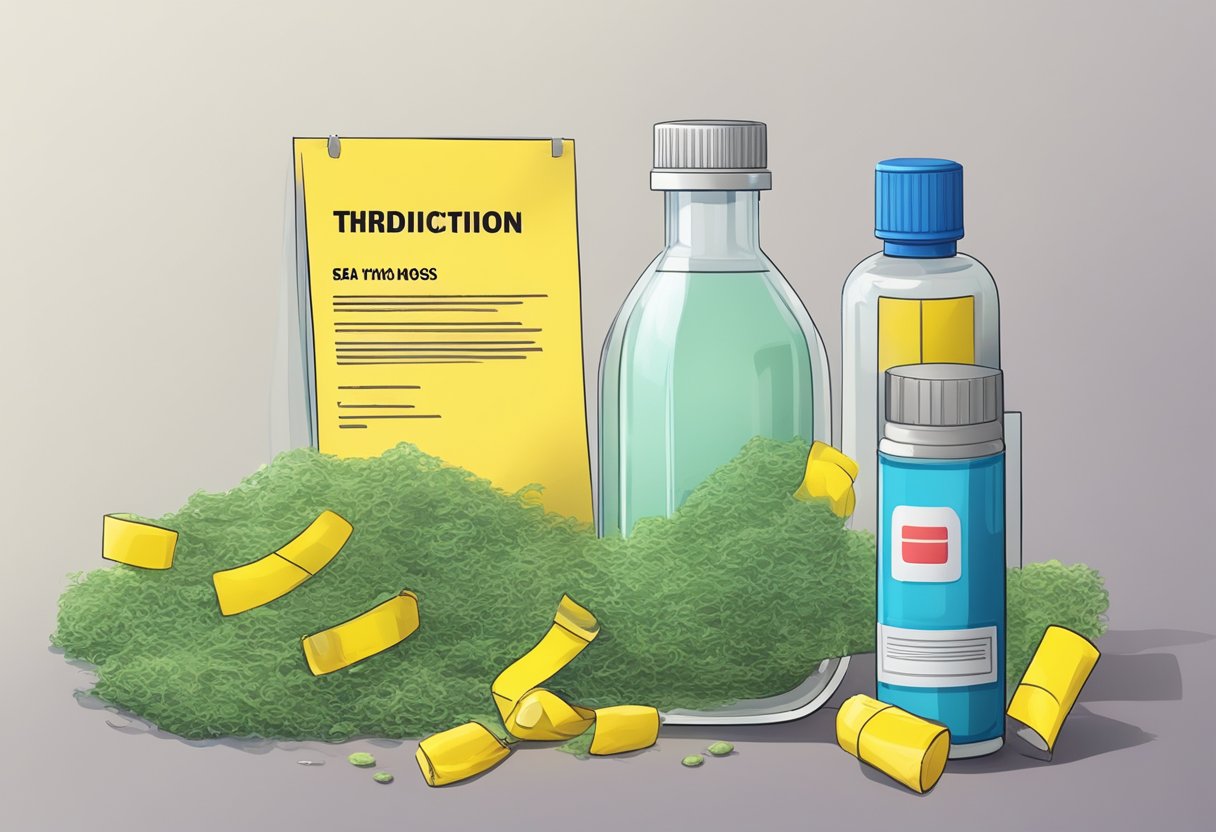Sea moss, a type of seaweed, has been gaining popularity for its potential health benefits. Among these benefits, its role in supporting thyroid function has caught the attention of many. The thyroid gland is vital for regulating hormones, metabolism, and overall body functions. An imbalance in thyroid hormones can lead to various health issues, including fatigue, weight gain, and depression.
With a rich nutrient profile, sea moss is believed to provide essential minerals and nutrients to support thyroid function. Consuming sea moss may help in maintaining a healthy balance of thyroid hormones and reducing the risk of thyroid-related disorders. However, it is also essential to understand the potential risks and considerations associated with sea moss consumption, particularly when it comes to thyroid health.
Incorporating sea moss into one's diet can be done in various ways, such as adding it to smoothies, soups, or using it as a thickening agent in recipes. As with any natural supplement, it is advisable to consult a healthcare professional before making significant dietary changes, especially for those with pre-existing thyroid conditions or concerns.
Key Takeaways
- Sea moss may support thyroid function by providing essential nutrients
- Adequate understanding of potential risks and considerations is necessary for sea moss use
- Consult a healthcare professional before making significant dietary changes involving sea moss
Understanding Thyroid Function

The thyroid gland is a vital part of the endocrine system, responsible for producing the hormones thyroxine (T4) and triiodothyronine (T3). These hormones play a crucial role in regulating metabolism, growth, and development. Maintaining proper thyroid function is essential for overall health and well-being.
Role of Diet in Thyroid Health
Diet plays a significant role in maintaining thyroid health. Consuming the right nutrients is necessary for hormone synthesis and overall gland function. Some essential nutrients for optimal thyroid health include:
- Iodine: The primary nutrient for thyroid hormone production and regulation.
- Selenium: Helps convert T4 to the more active T3 form and supports antioxidant defenses.
- Zinc: Involved in various aspects of the thyroid’s functioning and hormone synthesis.
Now, let's explore the relationship between sea moss and thyroid health.
Is Sea Moss Good for Thyroid?
Sea moss, a type of red algae, has gained popularity in recent years as a superfood with numerous health benefits. It is a rich source of vitamins, minerals, and trace elements, making it beneficial for overall wellbeing. In the context of thyroid health, sea moss is particularly beneficial due to its high iodine content. Iodine is essential for thyroid hormone production, and consuming adequate amounts can help support proper thyroid function.
Is Sea Moss Bad for Thyroid?
While sea moss offers potential benefits for thyroid health, it is essential to consume it in moderation. Excessive iodine intake may have adverse effects on thyroid function, particularly in individuals with pre-existing thyroid conditions. Consuming large amounts of sea moss or iodine supplements may lead to hyperthyroidism (overactive thyroid) or hypothyroidism (underactive thyroid) in susceptible individuals.
In conclusion, incorporating sea moss into a balanced diet may provide essential nutrients for maintaining healthy thyroid function. However, it is crucial to consume sea moss in moderation, as excessive iodine intake could adversely affect thyroid health.
Benefits of Sea Moss for Thyroid Health

Nutrient Content and Thyroid Support
Sea moss contains a wealth of nutrients that can provide essential support to the thyroid gland, particularly when it comes to the production and regulation of important hormones. Some of the key nutrients found in sea moss include iodine, selenium, and zinc.
- Iodine is a crucial component of thyroid hormones thyroxine (T4) and triiodothyronine (T3), which are responsible for regulating metabolism and energy production in the body.
- Selenium plays a role in the production and conversion of thyroid hormones, supporting the balance between the two hormones T4 and T3.
- Zinc is needed for the hypothalamus to communicate with the thyroid gland, helping in proper hormone regulation.
With its rich nutrient content, sea moss can help support healthy thyroid function and hormone production.
Thyroid Disorders and Sea Moss
For those suffering from thyroid disorders, such as hypothyroidism, the nutrients found in sea moss have been shown to provide potential benefits. Consuming sea moss, which is high in iodine, can assist the thyroid in producing the necessary amounts of hormones for proper functioning. Additionally, sea moss may aid in reducing inflammation, and its rich mineral content supports overall thyroid health and hormone balance.
However, it's important to note that it is not recommended to rely solely on sea moss as a treatment for thyroid disorders. Consulting a healthcare professional who specializes in thyroid conditions is essential for proper diagnosis and treatment.
Potential Risks and Considerations

Excessive Iodine Intake and Thyroid Health
While sea moss is praised for its iodine content, which can benefit those with an underactive thyroid, it is essential to be cautious of excessive iodine intake. Consuming too much iodine can lead to adverse effects on thyroid health, including hyperthyroidism, goiter, and thyroiditis. Therefore, it is vital to monitor iodine intake from all sources carefully.
Note the following points:
- The recommended daily allowance (RDA) of iodine for adults is 150 micrograms.
- A typical serving of sea moss may contain 4 to 8 times the RDA of iodine, depending on the preparation and portion size.
Be sure to consult with a healthcare professional before adding sea moss to your diet, especially if you have a history of thyroid disorders.
Interactions with Medications
Sea moss may interact with certain medications, such as thyroid hormones and anticoagulants. People taking these medications should be aware of the potential risks and discuss with their doctors before incorporating sea moss into their diets.
| Medication Type | Potential Interaction |
|---|---|
| Thyroid hormones | Excessive iodine in sea moss may affect the balance of thyroid hormones, leading to potential thyroid dysfunction. |
| Anticoagulants | Sea moss is a natural source of vitamin K, which plays a crucial role in blood clotting. Consuming large amounts of sea moss may interfere with the effectiveness of anticoagulant medications. |
To summarize, while sea moss offers various health benefits, it is important to consider the risks associated with excessive iodine intake and potential interactions with medications. Always consult with a healthcare professional before adding sea moss to your diet, particularly if you have a history of thyroid disorders or are taking medications that may interact with sea moss.
Incorporating Sea Moss into Your Diet

Recommended Dosages and Forms
When incorporating sea moss into your diet, it is essential to follow the recommended dosages and find the most suitable form for your needs. Below is a table summarizing the various forms and dosages to provide guidance for incorporating sea moss into your diet:
| Form | Recommended Dosage | Usage |
|---|---|---|
| Raw Sea Moss | 1-2 tbsp (per meal) | Rinse thoroughly and soak before use |
| Gel | 1-2 tbsp (per meal) | Prepared and used in smoothies, soups, etc. |
| Powder | 1-2 tsp (per day) | Mix into drinks or recipes |
Please consult a healthcare professional before starting any new dietary supplement, especially for those with potential allergic reactions or those with pre-existing thyroid conditions.
Sea Moss Recipes for Thyroid Support
To maximize the benefits of sea moss for thyroid health, here are some recipes that can be incorporated into your diet with ease:
-
Sea Moss Smoothie: Blend 1 cup of your preferred plant-based milk, 1 frozen banana, 1 cup of mixed berries, 1-2 tablespoons of sea moss gel, and a splash of vanilla extract. Enjoy this nutritious and thyroid-supporting smoothie as a breakfast or snack option.
-
Seaweed Salad: Combine 1 cup of soaked and drained raw sea moss with an assortment of seaweeds, such as nori and wakame. Toss with a dressing made from rice vinegar, soy sauce, sesame oil, and a touch of honey. Top your salad with sliced cucumber, green onions, and sesame seeds for a delicious and nutrient-dense meal.
-
Sea Moss Soup: Prepare a hearty vegetable soup with your choice of vegetables, such as carrots, celery, and onions. Add in 1-2 tablespoons of sea moss gel while cooking the soup to incorporate its nutritional benefits. Enjoy this warm and comforting dish on a cold day or as a light meal option.
Incorporate these recipes into your diet to enjoy the potential thyroid benefits of sea moss. Ensure to consult with a healthcare professional before making significant dietary changes, particularly for individuals with existing thyroid conditions or allergies.





